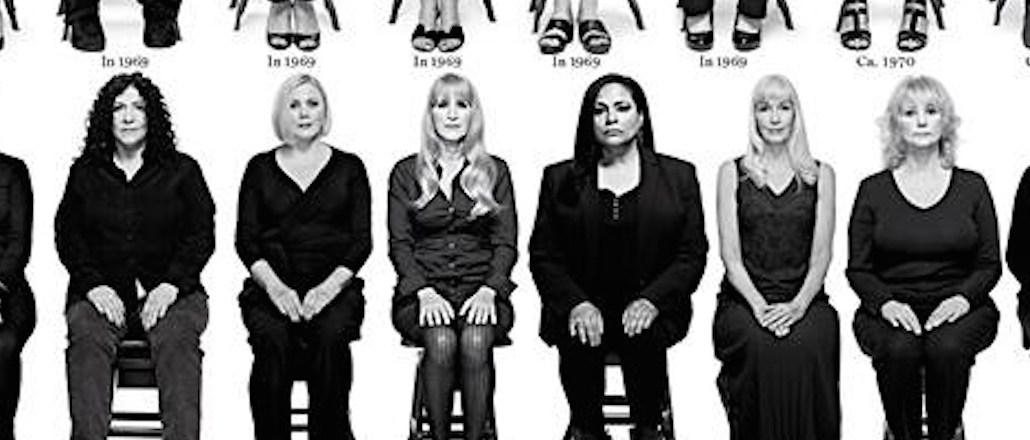Secure your place at the Digiday Media Buying Summit in Nashville, March 2-4
How #TheEmptyChair became the unofficial hashtag of New York Magazine’s Cosby cover

New York Magazine’s latest cover is instantly iconic. Pictured in black-and-white, it shows 35 women sitting down who have accused Bill Cosby of sexual assault with the powerful headline “Cosby: The Women. An unwelcome sisterhood.” An empty chair was also included to “signify those who have stayed silent.”
Written by Noreen Malone and Amanda Demme, the tremendous piece of journalism profiles each woman’s story with the comic, who would allegedly spike their drink with drugs and sexually assault them when they’re unconscious or impaired. Cosby has publicly denied the accusations, although a 2005 deposition of Cosby uncovered by the New York Times last week appears to confirm the victims’ stories.
Besides teasing it on Friday from its PR Twitter account, the story followed the usual roll-out of being published online the Sunday evening before the hardcopy hits newsstand on Monday. But it didn’t need any extra promotion as it quickly pinballed throughout the Internet and social media.
The first tweet from the magazine’s official account showing the cover racked up 11,000 retweets and 6,400 favorites. On Facebook, the cover garnered 7,700 likes and 5,800 shares with 600 comments. On Instagram, New York Magazine sliced up audio interviews from three of women punctuated with art illustrating their quotes.
35 women speak about being assaulted by Bill Cosby, and the culture that wouldn’t listen: https://t.co/H5dss5F2F4 pic.twitter.com/RCF0BWBrxA
— New York Magazine (@NYMag) July 27, 2015
But it was only on social media (and several other websites, including Vox, Gawker, Salon, Slate, etc. that aggregated it) where could readers find the story. New York Magazine’s website became inaccessible overnight because of a hacker who told the Daily Dot that they took it down because of their hatred for New York City. The website is still not back online as of this morning.
Interestingly, it wasn’t a hashtag created by New York Magazine that drove the conversation on Twitter, rather it was one made by users: #TheEmptyChair. It represents victims who are too scared to come forward because of shame or further abuse. Elon James White, journalist and editor of This Week in Blackness, first used the hashtag in relation to the cover, according to social media analytics firm Topsy. After tweeting the cover, he noticed that his followers were fixated on the empty chair and created the hashtag. His timeline is filled with anonymous direct messages relating to being the person too scared to come forward.
A DM sent to me: #TheEmptyChair pic.twitter.com/KkmGhaeTNx — Elon James White (@elonjames) July 27, 2015
A DM sent to me: “I can’t share my empty chair story bc I signed an NDA. needed the money more than justice, and he knew it” #TheEmptyChair
— Elon James White (@elonjames) July 27, 2015
A DM sent to me: #TheEmptyChair pic.twitter.com/VEZEOJwMaw — Elon James White (@elonjames) July 27, 2015
More than 10,000 tweets affixed with the hashtag #TheEmptyChair have been used, per data from Brandwatch.
“There is virtually no negative sentiment around this individual hashtag as the public has rallied on social to relay a message of support for sexual assault and rape victims who feel alone and helpless based on the most frequently mentioned topics in the conversation,” said analyst Kellan Terry.
The conversation surrounding the 35 women appearing on the cover has been supportive, with many users calling for change in how victims of sexual assault and rape are treated. Overall, women on Twitter are leading the conversation, amounting to 57 percent, compared to 43 percent men.
More in Media

From feeds to streets: How mega influencer Haley Baylee is diversifying beyond platform algorithms
Kalil is partnering with LinkNYC to take her social media content into the real world and the streets of NYC.

‘A brand trip’: How the creator economy showed up at this year’s Super Bowl
Super Bowl 2026 had more on-the-ground brand activations and creator participation than ever, showcasing how it’s become a massive IRL moment for the creator economy.

Media Briefing: Turning scraped content into paid assets — Amazon and Microsoft build AI marketplaces
Amazon plans an AI content marketplace to join Microsoft’s efforts and pay publishers — but it relies on AI com stop scraping for free.





